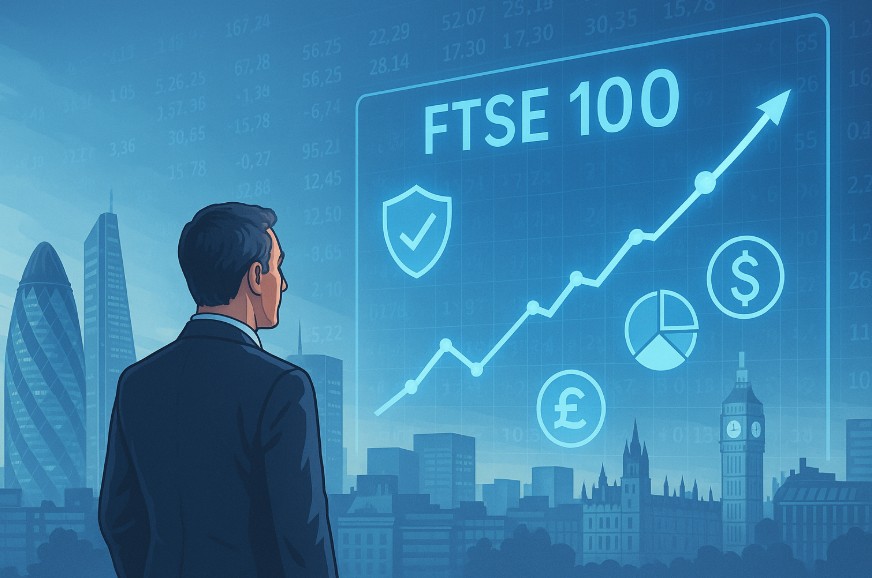Investing in the FTSE 100 offers UK investors a gateway to owning shares in some of the country’s most established and globally recognised companies. As we move into 2025, navigating the stock market requires not only strategy but also a solid understanding of the index itself.
Whether you’re a seasoned investor or just getting started, this guide explores how to invest in the FTSE 100 safely and effectively, focusing on accessible options, risk management, and long-term portfolio success.
What Is the FTSE 100 and Why Should UK Investors Care?
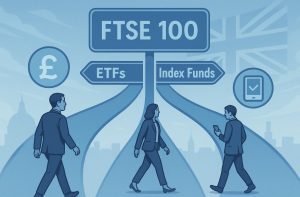
The FTSE 100, also known as the Financial Times Stock Exchange 100 Index, represents the 100 largest companies listed on the London Stock Exchange under the premium listing category.
This index acts as the primary benchmark for the performance of the UK stock market, and it’s often used as a yardstick to gauge the economic health of the country.
Established in 1984 by the Financial Times and the London Stock Exchange, the name “FTSE” comes from both founders. Today, it’s managed by FTSE Russell, a wholly owned subsidiary of the London Stock Exchange Group.
The FTSE 100 consists of well-known, blue-chip companies such as Shell, AstraZeneca, and HSBC. About 75% of these companies generate revenues from international markets, making the FTSE 100 not just a UK-centric index but one with global exposure.
In terms of sector allocation, as of early 2024:
- Energy, industrial goods and services, financials, and healthcare each make up around 11% of the index.
- Banks, tobacco, consumer goods, mining, and packaging are also well-represented.
- There is limited presence of technology companies, which has often been cited as a drawback when compared to indices like the S&P 500.
Despite its ‘old economy’ reputation, the FTSE 100 includes firms with stable earnings and consistent dividends—making it an attractive option for long-term and income-focused investors.
How Can Investors Buy Into the FTSE 100 in 2025?
Investing in the FTSE 100 in 2025 is more accessible than ever before, thanks to a wide range of digital platforms, diversified investment products, and simplified account setups.
UK investors have multiple entry points to gain exposure to this leading index, depending on their investment goals, experience, and risk tolerance.
Here are the most popular and practical methods:
1. Exchange-Traded Funds (ETFs)
ETFs remain one of the most efficient ways to invest in the FTSE 100. These funds are designed to replicate the performance of the index and are traded on the London Stock Exchange just like shares.
- Liquidity and Ease: Investors can buy and sell ETFs throughout the trading day (8am–4:30pm, Mon–Fri), providing flexibility.
- Low Costs: Most FTSE 100 ETFs have low management fees, typically between 0.07% and 0.15%.
- Examples: iShares Core FTSE 100 UCITS ETF (ISF), Vanguard FTSE 100 UCITS ETF (VUKE)
These are ideal for investors who want instant diversification with minimal costs.
2. Index Funds
Like ETFs, index funds aim to mirror the performance of the FTSE 100. The key difference is that they are priced once daily and do not trade on an exchange.
- Great for Long-Term Investors: Perfect for those adopting a “buy and hold” strategy.
- Automatically Managed: These funds require no active involvement or stock picking.
- Accessibility: Most UK investment platforms allow users to invest with small amounts monthly.
3. Online Investment Platforms
Most UK-based online brokers and investment services provide simple ways to access FTSE 100 investments.
Some top platforms include:
- AJ Bell: Offers both ETFs and index funds, along with ready-made portfolios.
- Vanguard UK: Known for low-cost investing, especially suitable for long-term investors.
- Freetrade and Trading212: Offer commission-free investing, ideal for younger investors.
These platforms offer intuitive mobile apps, research tools, and automatic reinvestment features, making investing more manageable for both beginners and experienced investors.
4. Direct Share Purchase
Investors with more experience and a higher risk appetite may choose to buy shares in individual FTSE 100 companies. This approach allows you to:
- Handpick stocks based on personal values or sector preferences
- Customise your portfolio for dividend income or capital growth
- Actively manage holdings
However, this method requires in-depth knowledge of company performance, industry trends, and economic factors. It also comes with higher volatility compared to ETFs or funds.
5. Robo-Advisors and Managed Portfolios
For those preferring a fully managed service, robo-advisors like Nutmeg or Moneyfarm offer portfolios with FTSE 100 exposure. These platforms:
- Automatically rebalance portfolios
- Adjust asset allocation based on your risk profile
- Often include ESG (Environmental, Social and Governance) options
These are suitable for passive investors who want exposure without hands-on involvement.
What Are the Safest Ways to Invest in the FTSE 100?
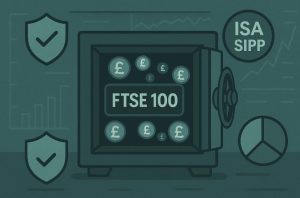
To invest safely in the FTSE 100, especially in 2025’s market landscape, investors should consider the following strategies:
- Diversify Across Sectors: Instead of investing in just one or two sectors, ensure your portfolio includes a mix of financials, energy, healthcare, and consumer goods.
- Use Tax-Efficient Wrappers: Investing through a Stocks and Shares ISA or a Self-Invested Personal Pension (SIPP) can shield your returns from income tax and capital gains tax.
- Start with Low-Cost Index Funds or ETFs: These are inherently diversified and reduce the risk of poor performance from a single stock.
- Avoid Market Timing: Long-term, consistent investing is more effective than trying to time market highs and lows.
These steps help to reduce risk and align with a stable, long-term investment strategy.
Which FTSE 100 Investment Vehicles Should Beginners Consider?
For new investors in the UK, selecting the right investment vehicle is crucial to building confidence and achieving long-term success. The key factors to consider include ease of use, risk level, fees, and accessibility.
Here are the most beginner-friendly FTSE 100 investment options:
1. FTSE 100 ETFs
Why they work for beginners:
ETFs are among the easiest and most cost-effective ways to gain exposure to all 100 companies in the index.
- Instant Diversification: A single purchase gives you ownership in companies across various sectors—energy, banking, healthcare, and consumer goods.
- Low Entry Barrier: Many platforms allow ETF purchases from as little as £1 or £10.
- Popular Choices: iShares Core FTSE 100 UCITS ETF (ISF), Vanguard FTSE 100 UCITS ETF (VUKE)
ETFs trade like stocks, offering transparency and control for new investors who want a balance between simplicity and flexibility.
2. AJ Bell Funds
Why they work for beginners:
AJ Bell offers a suite of multi-asset funds tailored to different goals and risk levels.
- Hands-Off Investing: Once you pick a fund, the portfolio is automatically managed by professionals.
- Built for Different Needs: AJ Bell offers funds focusing on capital preservation, income, and inflation-linked growth.
- Low Minimum Investment: Investors can start with just £25 per month.
Ideal for those who prefer automated investing with the backing of expert management.
3. FTSE 100 Index Funds
Why they work for beginners:
Index funds are passive investments that track the performance of the FTSE 100 without the need for constant oversight.
- Simple to Understand: No need to analyse individual companies—your money follows the index’s overall performance.
- Consistent Contributions: Many UK platforms allow you to set up monthly contributions via direct debit.
- No Trading Required: Index funds are bought and sold at a fixed price daily, removing the need to manage trades.
Great for individuals seeking steady, long-term wealth building.
4. Lifetime ISA (LISA) or Stocks and Shares ISA
Why they work for beginners:
These tax-efficient wrappers allow you to invest in FTSE 100 ETFs or funds with added benefits:
- Tax-Free Returns: No capital gains or dividend tax on investments held in an ISA.
- Government Bonus (LISA): Those aged 18–39 can receive a 25% government bonus annually on contributions up to £4,000.
- Simple Setup: Most major UK platforms offer ISA-compatible FTSE 100 investments.
This makes ISAs one of the best starting points for new investors in the UK market.
5. Ready-Made Portfolios
Why they work for beginners:
Platforms like Nutmeg, Moneybox, and Wealthify offer portfolios with built-in FTSE 100 exposure.
- Automatic Risk Balancing: Your money is allocated based on your risk profile.
- Includes FTSE and Other Assets: These portfolios often combine UK equities with global stocks, bonds, and cash.
- Ideal for Time-Starved Investors: Once set up, the platform manages everything.
Quick Comparison Table for Beginners:
| Investment Vehicle | Ease of Use | Minimum Investment | Management Style | Best For |
| FTSE 100 ETFs | High | £1–£100 | Self-managed | DIY beginners |
| AJ Bell Funds | Very High | £25+ | Professionally managed | Hands-off investors |
| FTSE 100 Index Funds | High | £100+ | Passive | Long-term, low-maintenance |
| Stocks and Shares ISA | High | £1+ | Self or professional | Tax-efficient investing |
| Ready-Made Portfolios | Very High | £1–£50 | Fully automated | Time-poor or new investors |
How Do FTSE 100 Dividends Benefit Long-Term Investors?
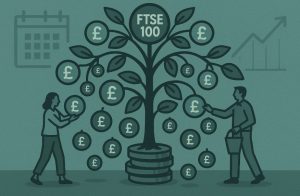
FTSE 100 companies are known for paying reliable dividends, which play a critical role in total investment returns. Dividend-paying stocks:
- Provide a regular income stream
- Help to cushion portfolio losses during market downturns
- Offer the potential for dividend reinvestment, compounding wealth over time
High-yielding FTSE stocks such as BP, Vodafone, and British American Tobacco have historically contributed significantly to investor returns.
What Are the Potential Risks When Investing in the FTSE 100?
Despite its benefits, investing in the FTSE 100 isn’t risk-free. Investors should be mindful of:
- Market Volatility: Global events, elections, and economic policies can impact index performance.
- Currency Fluctuations: Since many companies earn in foreign currencies, GBP strength can affect profits.
- Sector Imbalances: Heavy concentration in sectors like energy and finance can pose risks during downturns in those industries.
Understanding these risks helps investors to make informed and balanced decisions.
How Is the FTSE 100 Expected to Perform in 2025 and Beyond?
Analysts expect moderate growth from the FTSE 100 in 2025, driven by:
- A potential interest rate cut by the Bank of England
- Strong performance from energy and healthcare stocks
- Stable dividend payouts
While it’s unlikely to match the high growth rates of tech-heavy indices like the Nasdaq, the FTSE 100 remains attractive for income and long-term stability.
How Can Investors Track and Manage Their FTSE 100 Portfolio?
Monitoring your investments is vital. Here’s how investors can stay on top of their FTSE 100 holdings:
- Use Investment Platforms: Platforms like AJ Bell and HL offer portfolio tracking tools.
- Mobile Apps: Most brokers provide mobile apps for daily performance checks.
- Quarterly Rebalancing: Adjust your portfolio to maintain your target asset allocation.
- Set Alerts: Use alerts to stay informed about major index changes and company earnings reports.
Regularly reviewing and rebalancing helps to keep your investment strategy aligned with your financial goals.
How Does FTSE 100 Fit into a Diversified UK Investment Portfolio?
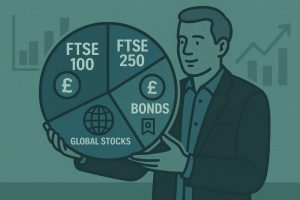
The FTSE 100 should be a core holding in a well-rounded UK portfolio, but not the only component. Consider combining it with:
- FTSE 250 (Mid-Cap Companies): Offers exposure to faster-growing domestic firms.
- Global Equity Funds: Adds international diversification.
- Government and Corporate Bonds: Provides capital stability.
This balanced approach reduces risk while maximising growth potential over time.
What Are the Tax Implications of FTSE 100 Investments in the UK?
Taxes can reduce overall returns, so it’s important to understand the implications:
- Capital Gains Tax (CGT): Payable on profits exceeding the annual exemption (£3,000 for 2025/26).
- Dividend Tax: Basic rate taxpayers pay 8.75% on dividends above the £500 allowance.
- ISA and SIPP Tax Benefits: Investments held in these accounts are free from income tax and CGT.
Using tax-efficient wrappers is essential to maximising net gains from FTSE 100 investing.
Conclusion
The FTSE 100 remains a solid option for UK investors seeking income, stability, and global exposure. While it lacks tech dominance, its high-dividend companies and sector diversity make it a strong foundation for most portfolios.
Whether you’re a beginner or seasoned investor, having a strategic plan—using ISAs, ETFs, and diversified funds—will ensure you make the most of FTSE 100 investments in 2025 and beyond.
FAQs About Investing in the FTSE 100
Is investing in the FTSE 100 suitable for beginners?
Yes, it’s ideal due to its simplicity, broad diversification, and availability via ETFs and index funds.
How much money do I need to start investing in the FTSE 100?
You can start with as little as £25/month through certain platforms or make a one-time investment of £50–£100 in an ETF.
Can I invest in the FTSE 100 through my pension?
Absolutely. Many pension funds and SIPPs include FTSE 100 exposure due to its dividend-paying nature.
Are FTSE 100 investments risky during economic downturns?
They carry risk like any equity investment but tend to be more stable due to the nature of the companies involved.
Which platform is best to invest in FTSE 100 from the UK?
Popular UK platforms include AJ Bell, Hargreaves Lansdown, Vanguard, and Freetrade.
Do FTSE 100 companies always pay dividends?
Not all, but many do—especially in sectors like energy, consumer goods, and finance.
What’s the difference between FTSE 100 and FTSE 250?
FTSE 100 includes the largest 100 UK companies, while FTSE 250 contains the next 250 mid-sized firms, often with higher growth potential.

